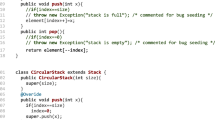Abstract
Although the object-oriented paradigm has been gaining wide popularity in recent years, little work has been done on how to test objectoriented software systems. We believe that many special programming features found in the object-oriented paradigm will also play important roles during the testing phase. In this paper, we propose a conformance testing method for object-oriented software systems. The conformance relation that can be tested by this method is based on a modified version of the acceptance tree model and takes into account the special requirements imposed by the inheritance mechanism — which we believe is the most important feature provided by the object-oriented paradigm. The proposed method allows us to test, under certain assumptions, whether an object instance implementation conforms to a given class specification by applying to the implementation the test cases derived from the given class specification.
This research was supported by a grant from the Canadian Institute for Telecommunications Research under the NCE program of the Government of Canada.
Chapter PDF
Similar content being viewed by others
References
S. Abramsky: Observation equivalence as a testing equivalence, Theoretical Computer Science 53 (1987) 225–241.
A special issue on object-oriented design, Communication of the ACM 33 (9) (1990)
G. v. Bochmann and R. Gotzein: Specialization of object behaviors and requirement specifications, Technical Report (Draft) Département d'informatique et de recherche opérationelle, Université de Montréal (1992).
G. v. Bochmann: On the specialization of object behaviors, in J.Palsberg & M.I.Schwartzbach (eds.), Types, Inheritance and Assignments, a collection of position papers from the ECOOP'91 workshop W5, Geneva, Switzerland (July 1991).
E. Brinksma, et al: Lotos specification, their implementation and their tests, in B. Sarakaya and G. v. Bochmann (eds.), Protocol Specification, Testing, and Verification VI, North Holland, Amsterdam (1987) 349–360.
E. Brinksma: A theory for the derivation of tests, in S. Aggarwal (ed.), Protocol Specification, Testing, and Verification VIII, North Holland, Amsterdam (1988) 63–74.
E. Brinksma: A formal approach to testing distributed systems, draft version.
S. Fujiwara and G.v. Bochmann: Testing non-deterministic finite state machines with fault coverage, Proc. 4th International Workshop on Protocol Test Systems, Leidschendam, the Netherlands (October 15–17, 1991).
M. Hennessy: Acceptance trees, J. ACM 32 (4) (1985) 896–928.
M. Hennessy: Algebraic theory of processes, The MIT Press (1988).
ISO/DIS/8807, LOTOS — A formal description technique based on the temporal ordering of observational behavior, (1987).
R. Langerak: A testing theory for LOTOS using deadlock detection, in E. Brinksma, G. Scollo and C. A. Vissers (eds.), Protocol Specification, Testing, and Verification IX, North Holland, Amsterdam (1990) 87–98.
K. G. Larsen and A. Skou: Bisimulation through probabilistic testing, R88-29, Department of Math, and Compt. Sci., Aalborg University Center (1988).
E. H. Htite: Génération de tests pour le service de communication personnalisé, Mémoire de maîtrise ès sciences (M.Sc), Département d'informatique et de recherche opérationelle, Université de Montréal, 1992.
F. Kendek and G.v. Bochmann: Merging Specification Behaviors, submitted for publication, 1992.
M. Yao, A. Petrenko and G.v. Bochmann: Conformance Testing of Protocol Machines without Reset, submitted for publication, 1992.
Author information
Authors and Affiliations
Editor information
Rights and permissions
Copyright information
© 1993 Springer-Verlag Berlin Heidelberg
About this paper
Cite this paper
Yao, M.Y., v. Bochmann, G. (1993). Testing for a conformance relation based on acceptance. In: Gaudel, M.C., Jouannaud, J.P. (eds) TAPSOFT'93: Theory and Practice of Software Development. CAAP 1993. Lecture Notes in Computer Science, vol 668. Springer, Berlin, Heidelberg. https://doi.org/10.1007/3-540-56610-4_86
Download citation
DOI: https://doi.org/10.1007/3-540-56610-4_86
Published:
Publisher Name: Springer, Berlin, Heidelberg
Print ISBN: 978-3-540-56610-6
Online ISBN: 978-3-540-47598-9
eBook Packages: Springer Book Archive




